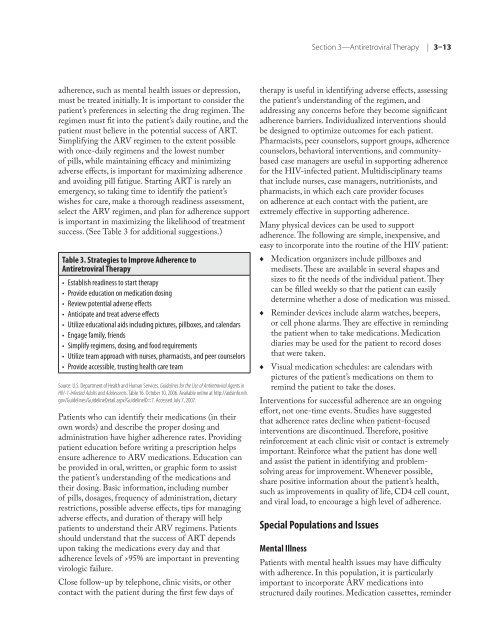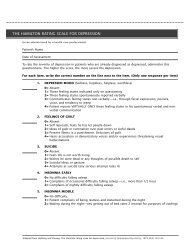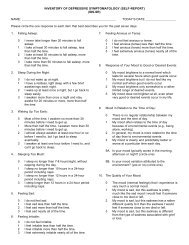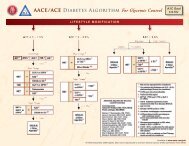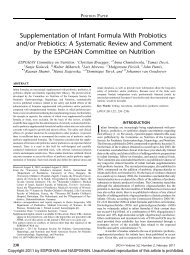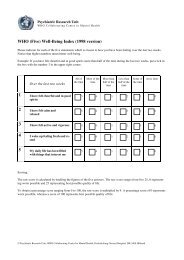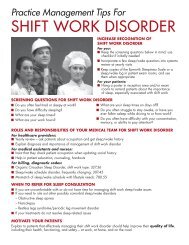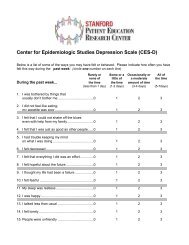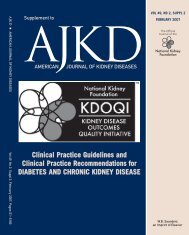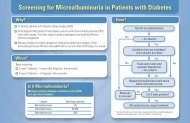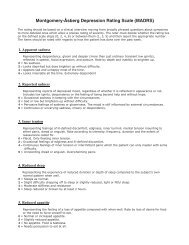Clinical Manual for Management of the HIV-Infected ... - myCME.com
Clinical Manual for Management of the HIV-Infected ... - myCME.com
Clinical Manual for Management of the HIV-Infected ... - myCME.com
You also want an ePaper? Increase the reach of your titles
YUMPU automatically turns print PDFs into web optimized ePapers that Google loves.
adherence, such as mental health issues or depression,<br />
must be treated initially. It is important to consider <strong>the</strong><br />
patient’s preferences in selecting <strong>the</strong> drug regimen. The<br />
regimen must fit into <strong>the</strong> patient’s daily routine, and <strong>the</strong><br />
patient must believe in <strong>the</strong> potential success <strong>of</strong> ART.<br />
Simplifying <strong>the</strong> ARV regimen to <strong>the</strong> extent possible<br />
with once-daily regimens and <strong>the</strong> lowest number<br />
<strong>of</strong> pills, while maintaining efficacy and minimizing<br />
adverse effects, is important <strong>for</strong> maximizing adherence<br />
and avoiding pill fatigue. Starting ART is rarely an<br />
emergency, so taking time to identify <strong>the</strong> patient’s<br />
wishes <strong>for</strong> care, make a thorough readiness assessment,<br />
select <strong>the</strong> ARV regimen, and plan <strong>for</strong> adherence support<br />
is important in maximizing <strong>the</strong> likelihood <strong>of</strong> treatment<br />
success. (See Table 3 <strong>for</strong> additional suggestions.)<br />
Table 3. Strategies to Improve Adherence to<br />
Antiretroviral Therapy<br />
•<br />
•<br />
•<br />
•<br />
•<br />
•<br />
•<br />
•<br />
•<br />
Establish readiness to start <strong>the</strong>rapy<br />
Provide education on medication dosing<br />
Review potential adverse effects<br />
Anticipate and treat adverse effects<br />
Utilize educational aids including pictures, pillboxes, and calendars<br />
Engage family, friends<br />
Simplify regimens, dosing, and food requirements<br />
Utilize team approach with nurses, pharmacists, and peer counselors<br />
Provide accessible, trusting health care team<br />
Source: U.S. Department <strong>of</strong> Health and Human Services. Guidelines <strong>for</strong> <strong>the</strong> Use <strong>of</strong> Antiretroviral Agents in<br />
<strong>HIV</strong>-1-<strong>Infected</strong> Adults and Adolescents. Table 16. October 10, 2006. Available online at http://aidsinfo.nih.<br />
gov/Guidelines/GuidelineDetail.aspx?GuidelineID=7. Accessed July 7, 2007.<br />
Patients who can identify <strong>the</strong>ir medications (in <strong>the</strong>ir<br />
own words) and describe <strong>the</strong> proper dosing and<br />
administration have higher adherence rates. Providing<br />
patient education be<strong>for</strong>e writing a prescription helps<br />
ensure adherence to ARV medications. Education can<br />
be provided in oral, written, or graphic <strong>for</strong>m to assist<br />
<strong>the</strong> patient’s understanding <strong>of</strong> <strong>the</strong> medications and<br />
<strong>the</strong>ir dosing. Basic in<strong>for</strong>mation, including number<br />
<strong>of</strong> pills, dosages, frequency <strong>of</strong> administration, dietary<br />
restrictions, possible adverse effects, tips <strong>for</strong> managing<br />
adverse effects, and duration <strong>of</strong> <strong>the</strong>rapy will help<br />
patients to understand <strong>the</strong>ir ARV regimens. Patients<br />
should understand that <strong>the</strong> success <strong>of</strong> ART depends<br />
upon taking <strong>the</strong> medications every day and that<br />
adherence levels <strong>of</strong> >95% are important in preventing<br />
virologic failure.<br />
Close follow-up by telephone, clinic visits, or o<strong>the</strong>r<br />
contact with <strong>the</strong> patient during <strong>the</strong> first few days <strong>of</strong><br />
Section 3—Antiretroviral Therapy | 3–13<br />
<strong>the</strong>rapy is useful in identifying adverse effects, assessing<br />
<strong>the</strong> patient’s understanding <strong>of</strong> <strong>the</strong> regimen, and<br />
addressing any concerns be<strong>for</strong>e <strong>the</strong>y be<strong>com</strong>e significant<br />
adherence barriers. Individualized interventions should<br />
be designed to optimize out<strong>com</strong>es <strong>for</strong> each patient.<br />
Pharmacists, peer counselors, support groups, adherence<br />
counselors, behavioral interventions, and <strong>com</strong>munitybased<br />
case managers are useful in supporting adherence<br />
<strong>for</strong> <strong>the</strong> <strong>HIV</strong>-infected patient. Multidisciplinary teams<br />
that include nurses, case managers, nutritionists, and<br />
pharmacists, in which each care provider focuses<br />
on adherence at each contact with <strong>the</strong> patient, are<br />
extremely effective in supporting adherence.<br />
Many physical devices can be used to support<br />
adherence. The following are simple, inexpensive, and<br />
easy to incorporate into <strong>the</strong> routine <strong>of</strong> <strong>the</strong> <strong>HIV</strong> patient:<br />
♦<br />
♦<br />
♦<br />
Medication organizers include pillboxes and<br />
medisets. These are available in several shapes and<br />
sizes to fit <strong>the</strong> needs <strong>of</strong> <strong>the</strong> individual patient. They<br />
can be filled weekly so that <strong>the</strong> patient can easily<br />
determine whe<strong>the</strong>r a dose <strong>of</strong> medication was missed.<br />
Reminder devices include alarm watches, beepers,<br />
or cell phone alarms. They are effective in reminding<br />
<strong>the</strong> patient when to take medications. Medication<br />
diaries may be used <strong>for</strong> <strong>the</strong> patient to record doses<br />
that were taken.<br />
Visual medication schedules: are calendars with<br />
pictures <strong>of</strong> <strong>the</strong> patient’s medications on <strong>the</strong>m to<br />
remind <strong>the</strong> patient to take <strong>the</strong> doses.<br />
Interventions <strong>for</strong> successful adherence are an ongoing<br />
ef<strong>for</strong>t, not one-time events. Studies have suggested<br />
that adherence rates decline when patient-focused<br />
interventions are discontinued. There<strong>for</strong>e, positive<br />
rein<strong>for</strong>cement at each clinic visit or contact is extremely<br />
important. Rein<strong>for</strong>ce what <strong>the</strong> patient has done well<br />
and assist <strong>the</strong> patient in identifying and problemsolving<br />
areas <strong>for</strong> improvement. Whenever possible,<br />
share positive in<strong>for</strong>mation about <strong>the</strong> patient’s health,<br />
such as improvements in quality <strong>of</strong> life, CD4 cell count,<br />
and viral load, to encourage a high level <strong>of</strong> adherence.<br />
Special Populations and Issues<br />
Mental Illness<br />
Patients with mental health issues may have difficulty<br />
with adherence. In this population, it is particularly<br />
important to incorporate ARV medications into<br />
structured daily routines. Medication cassettes, reminder


